25 Jul 2016
UNWTO peace tourism conference helps Sri Lanka strengthen swords-to-ploughshares strategy
Passikudah, Sri Lanka – Seven years after the guns fell silent in Sri Lanka, the former battlefields of the country’s North and East Coasts hosted the first UN World Tourism Organisation conference on how tourism can play a role in building local, regional, social, cultural and communal peace.
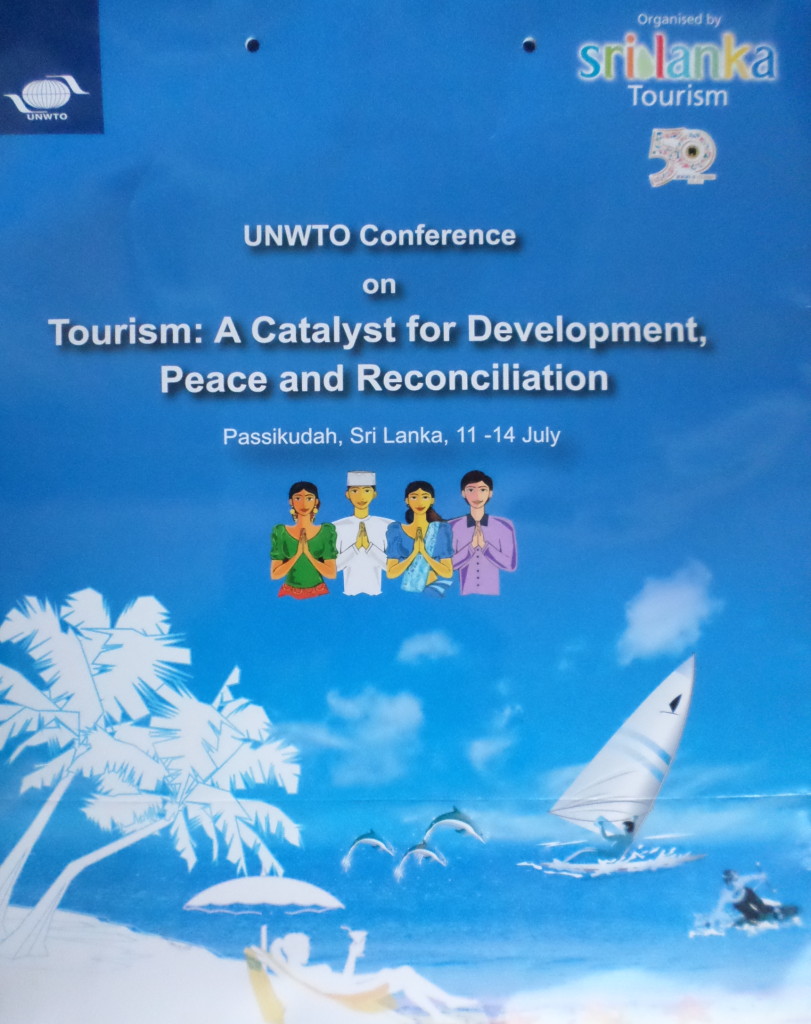 Conference emblem |
It was the perfect theme in the perfect location at the perfect time. Hosted and co-organised by the Sri Lankan Tourism Development Authority between 11-14 July 2016, the conference on the theme of “Tourism: a Catalyst for Development, Peace and Reconciliation” saw speakers from around the world offering unique perspectives and experiences on converting swords to ploughshares. Mr. John Amaratunga, Minister of Tourism Development and Christian Religious Affairs and Lands, observed, “While the world around us is in turmoil, we are enjoying absolute peace and I know for a fact that this peace will be protected at all costs. The message that we want to tell the world, is that Sri Lanka is one of the safest places to travel to today.”
The choice of location was deliberate. Passikudah is a rapidly emerging tourist city on the East Coast of Sri Lanka which was ravaged by the 1983-2009 civil war. Following the example of Nusa Dua on Bali, the government has leased out parcels of land to hotels investors and developers on long-term agreements, resulting in a number of world-class, indigenously-owned hotels directly on the beach-front. The entire North and East Coast is sparsely populated with a demographic mix of Sinhalese, Tamils and Muslims. Although the war has ended, political and ethnic extremists still exist amongst the ranks of all three groups. The challenge of keeping them in check is being met by creating jobs, and tourism offers by far the most promising opportunity.
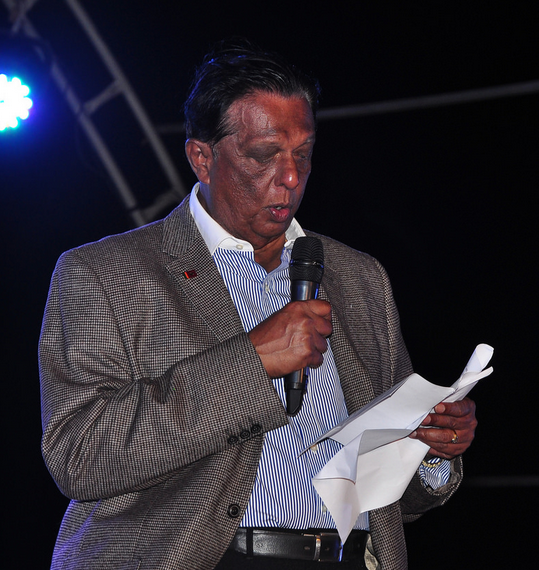 Mr. John Amaratunga, Minister of Tourism Development and Christian Religious Affairs and Lands |
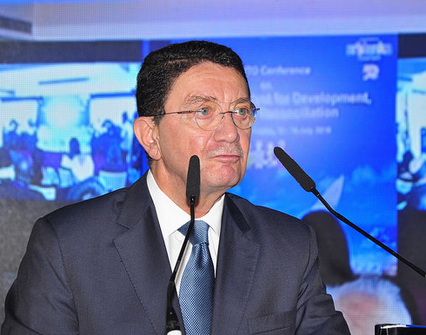 UNWTO Secretary-General Dr Taleb Rifai |
The idea of holding a conference on this theme was broached by SLTDA Chairman Mr. Paddy Withana to UNWTO Secretary-General Dr Taleb Rifai at another UNWTO event about a year ago. Recognising the enormous local and global potential of the idea, Dr Rifai said he “immediately jumped on it.” The timing fitted well with the golden jubilee of the 1966 formation of the former “Ceylon Tourist Board” in 1966 and preceded the golden jubilee of the UN’s 1967 declaration of the ‘International Tourism Year’ with the tagline ‘Tourism: Passport to Peace’.
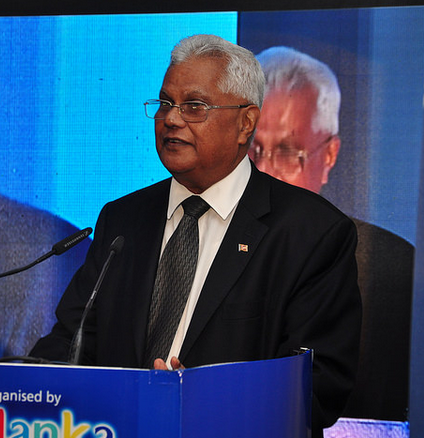 SLTDA Chairman Mr. Paddy Withana |
In its introduction to the event, the UNWTO noted that Sri Lanka was one of Asia’s pioneering countries to start developing tourism on a firm and planned basis. Then came 26 years of ethnic conflict which impacted the entire country, making much of the North and East inaccessible. The end of the conflict has resulted in a rapid recovery. Visitor arrivals almost doubled from 448,000 in 2009 to 856,000 in 2011 and soared to almost 1.8 million in 2015. The SLTDA is projecting 2.5 million arrivals for 2016.
In 2015, a unity government was set up comprising all the mainstream political parties, “an occurrence that is unique in the annals of Asian politics,” according to the UNWTO. “The main aim of the national Government is to restore peace and bring about reconciliation.” Says the UNWTO, “The opportunities for tourism development are great, nevertheless the challenges for recovery and reconciliation call for thought, discussion and a concerted plan of action by the public and private sectors.”
Such thought and discussion is exactly what occurred at the conference. Some powerful opening speeches helped set the scene. Minister Amaratunga said: “Today we see in real life how tourism has become a catalyst in transforming the lives of the local people both economically and socially. When local economies that suffered the brunt of the war become economically stable and the people well-off financially, reconciliation becomes that much easier. It has been said over many years that the root cause of the conflict here was economic inequality and marginalization of certain communities. We have learnt our lessons. Tourism is one of the few industries that can develop economies overnight.”
He said that a region which was out of bounds for almost three decades is today seeing “investors lining up to put up hotels.” The minister added, “The revenue that we earn from this industry is the peace dividend that the country has received with the end of the conflict. This government is determined to ensure that this dividend is first enjoyed by those who were at the receiving end during the war. In other words we want the local community to be the biggest beneficiary of the peace dividend.”
UNWTO chief Dr Rifai said “the world is facing many kinds of deficits these days, deficits of inequality, knowledge and technology but the most critical deficit is the deficit of tolerance. And if there is any force that can make a change in this and remedy this gap, it is travel.” He lauded the “spirit of unity and dignity that is spreading all around Sri Lanka, and the role of a robust tourism industry in promoting tolerance and understanding and contributing to development.”
Taking a global worldview, Dr Rifai invoked the examples of countries such as Croatia, Slovenia, the Czech Republic, Hungary, Vietnam and Cambodia which only a few decades ago were wracked by conflicts and upheavals but are today enjoying booming tourism sectors. Croatia is getting 12 million visitors. Vietnam and Cambodia both have hosted major UNWTO conferences. Another country, Colombia, which only a few years ago was in the hands of drug mafia syndicates, last year hosted the UN General Assembly.
He called on Sri Lanka to integrate tourism into the peace, reconciliation and development process so that it can realise its full potential for creating jobs, especially amongst the small and medium sized enterprises. Sri Lanka, he said, “needs to win the new battle for the hearts and minds of the people” and “confront the “forces of darkness which are not leaving any part of the world untouched.” He added, “Our core business is to make this world a better place and what better place to do that than here in Passikudah.”
The speeches that followed reflected the depth of history and experience compiled to underscore the theme.
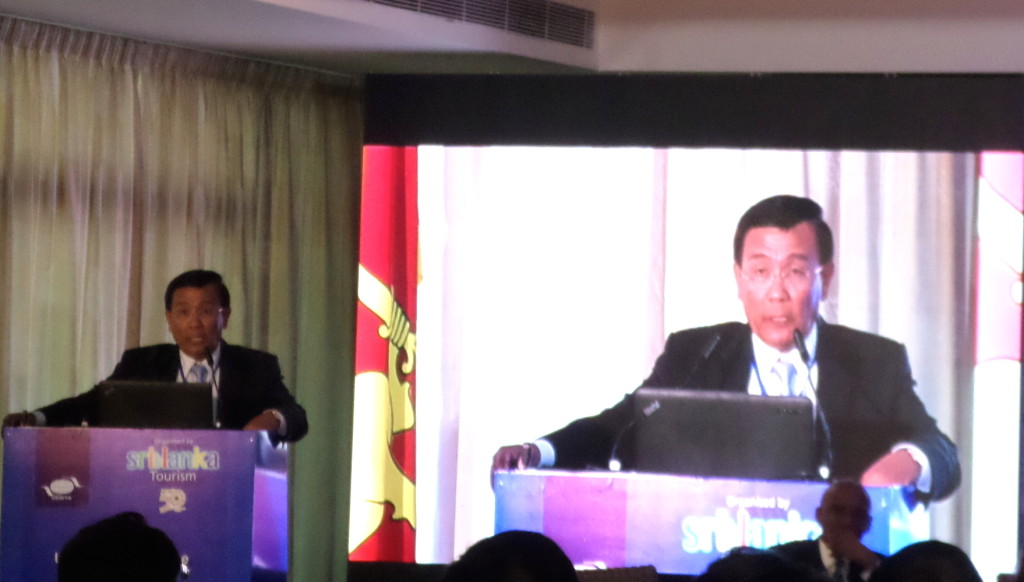 Mr Chantha Tith, Deputy Minister of Tourism, Cambodia |
Mr Chantha Tith, Deputy Minister of Tourism, Cambodia, narrated his country’s tragic experience in the aftermath of the genocidal Khmer Rouge who, he emphasized, had wiped out all the human capital in a mere three years. “In Sri Lanka, you are lucky, you still had your people to help rebuild the country. In Cambodia, we had nothing. We had to rebuild from Ground Zero.”
European MP István Ujhelyi of Hungary, Vice-Chair of the Transport & Tourism Committee and Chair of the Tourism Task Force, asserted that “all conflicts, wars (are) created by the political decision-makers. I am happy to hear you say that lots of decision makers, politicians and diplomats would like to have peace for your country. And they believe that if we like to do it, we can do it with tourism.” He said tourism delivers bigger benefits than just economic or recreational. “It’s more complex than that. It is a flow of ideas, capital, experiences.” He said the industry needed more quality decision-makers and more pilot projects to take forward the concept of peace and tourism.
Mrs. P.S.M.Charles, District Secretary of Batticaloa, said tourism is an important component of the development paradigm in the region. She said most of the local population is still under the poverty line and that there are serious issues with unemployment, marginalisation of small farmers, outward-migration of youth and increasing inequality. She said a tourism plan was being prepared for Batticaloa with the help of ILO, UNDP and the European Union.
 HIndu-Muslim fraternity – Sri Lankan Parliamentarians S. Yogeswaran and Nazeer Ahmed. |
Mr. Z. A. Nazeer Ahmed, Chief Minister, Eastern Provincial Council, outlined the extensive political, social, cultural challenges still facing the region but noted that all the key players and decision-makers were committed to the goal of making the East Coast into the “Second Gold Coast”. Mr Hiran Cooray, Chairman of Jetwing Hotels Ltd, Sri Lanka, talked about how he had come first to Jaffna in 2011, two years after the civil war ended. He narrated the difficulties he had in setting up a hotel there but noted that Jetwing was today proud to have two hotels in the region, one each in Jaffna and Passikudah.
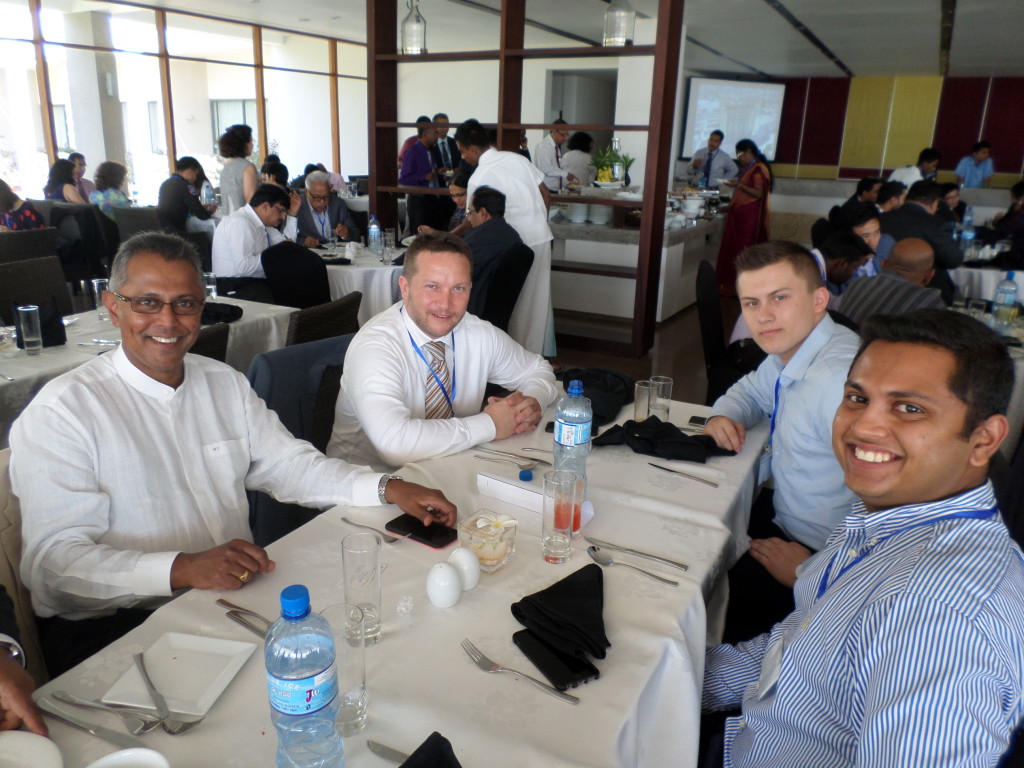 Father-and-son duos: Jetwing Hotels chairman Hiran Cooray and European MP István Ujhelyi with their sons. |
Mr Hiroshi Sawabe, Executive Director, Office of International Tourism, Japan Association of Travel Agents (JATA), said that his impression of Sri Lanka has changed 180 degrees since his arrival in Passikudah, a place he had never heard of before being invited to speak. Mr Peter Wong, Executive Chairman, China Chamber of Tourism, China, called for tourism to chart a “PHD course.” Elaborating on the acronym, he said PHD stood for “Peace and Harmony through Development.” Cape Town-based Ms Anita Mendiratta, Special Advisor to the UNWTO Secretary-General, cited the example of South Africa and the work done to rebuild the country in the post-apartheid era.
This editor was the only travel & tourism journalist from Asia invited to both speak at and cover this historic conference. In my presentation, I called on Sri Lanka tourism authorities to exploit “the last mover advantage” and convert the lessons learned from years of conflict into decades of true peace. I argued that Sri Lanka has a unique opportunity to become the first country to align its tourism development agenda with three ready-made global agendas of the United Nations: 1) the UN Sustainable Development Goals, 2) the Alliance of Civilisations, and the third and most important, the outcome of the recently convened World Humanitarian Summit. “This last event was not just about humanitarian efforts,” I said. “It was a deeper look at the value of human life.”
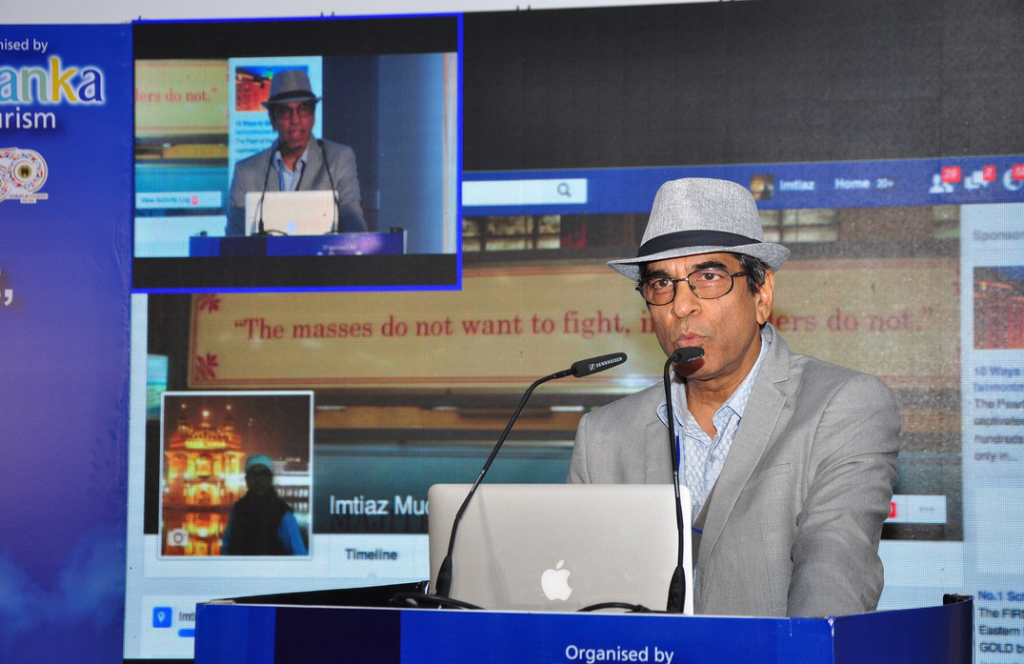 Travel Impact Newswire Executive Editor Imtiaz Muqbil |
I also said it would be “unrealistic to believe that there is ever going to be global peace, no matter how many billion tourists we create. One reason for that is because the industry of death is far bigger than the industry of peace. Just took at the global military budgets and you will see that there is much more shareholder value and return on investments in selling arms and ammunition. The global military-industrial complex will never allow peace to prevail. Never. If one war ends, another will start.”
After the conference, delegates were taken on visits to temples which also reflected the ethnic composition of the region: The Hindu Koneshwaran Temple in Trincomalee, another Hindu temple and the Nagadeepa Purana Viharaya Buddhist temple in Jaffna. No mosques were included but I indulged my personal passion and found an elegant mosque very close to the Jetwing hotel in Jaffna. The most wonderful symbol of integration I found was the multi-faith prayer shrine at the Nilaweli Beach hotel in Trincomalee where, very literally, the symbols of all four major religions, Buddhism, Hinduism, Christianity and Islam, were co-located side by side. If all global hotels, airports, convention centres and other citadels of tourism set up similar prayer facilities, it would make an enormous contribution to the cause of making tourism a truly peace industry.
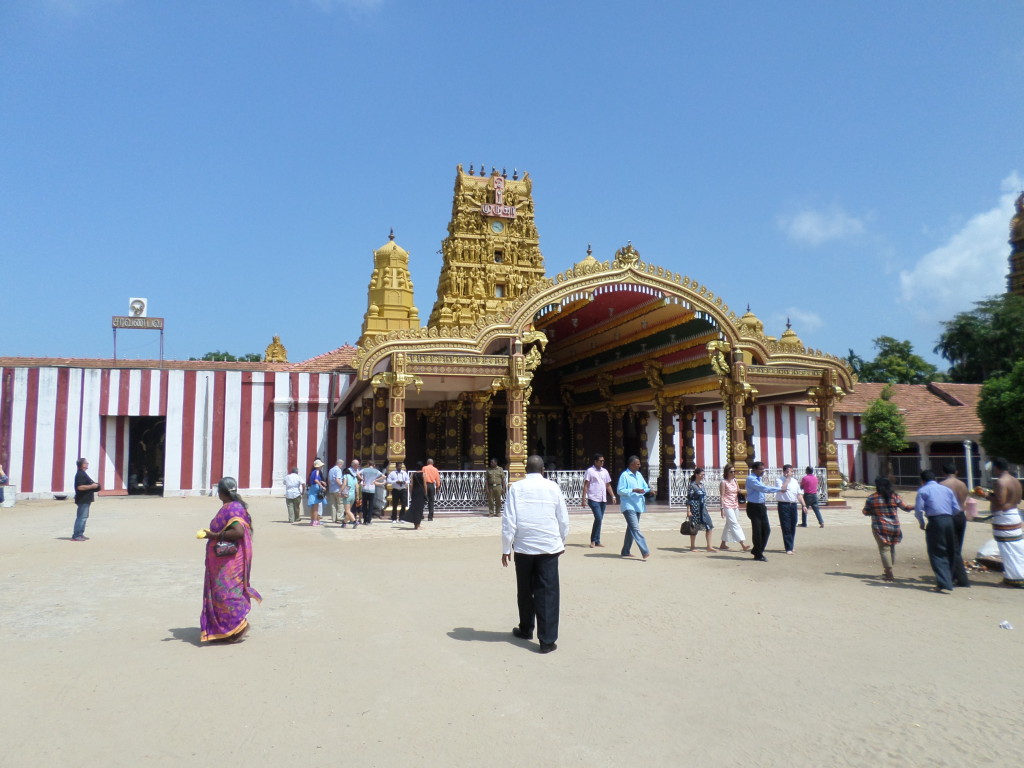 The Hindu Koneshwaran Temple in Trincomalee |
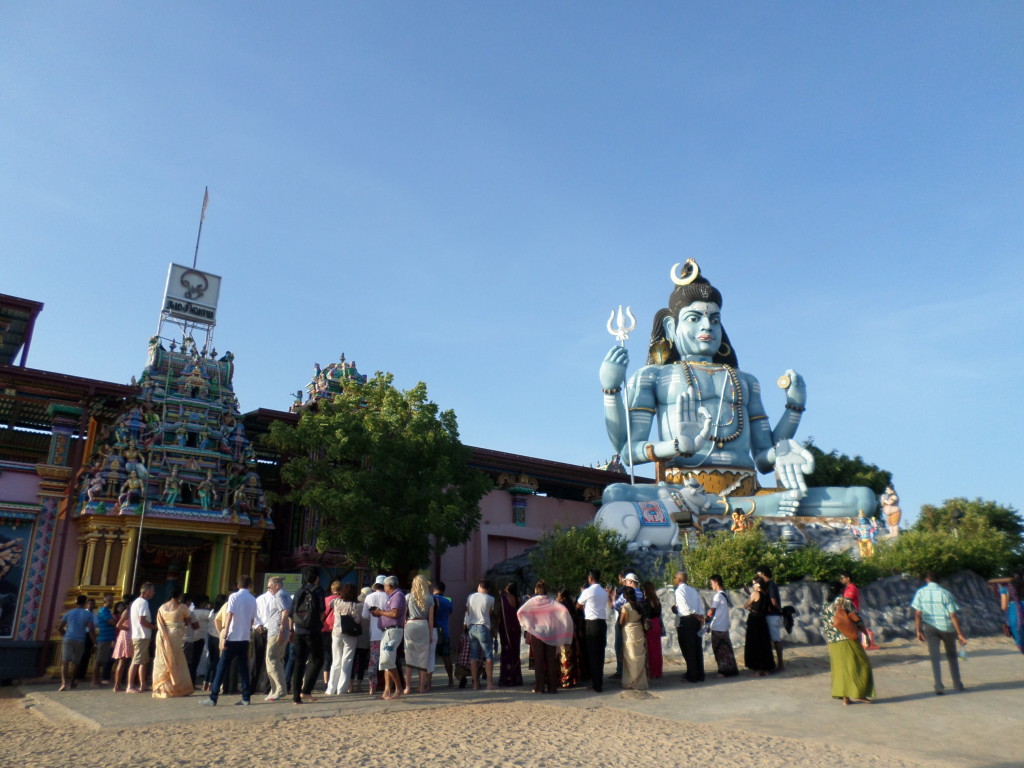 Another Hindu temple in Jaffna |
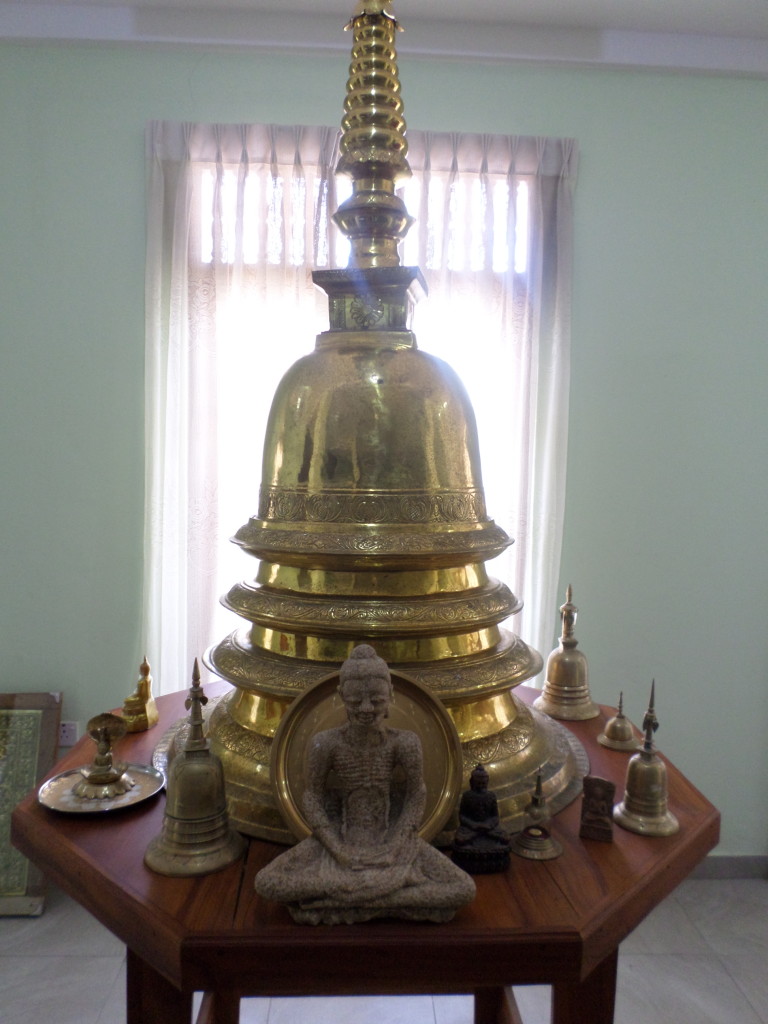 Pictures were not allowed inside the Nagadeepa Purana Viharaya Buddhist temple in Jaffna but this Buddha Image was exhibited in one of the buildings in the temple grounds. |
 The Executive Editor in a Jaffna mosque. |
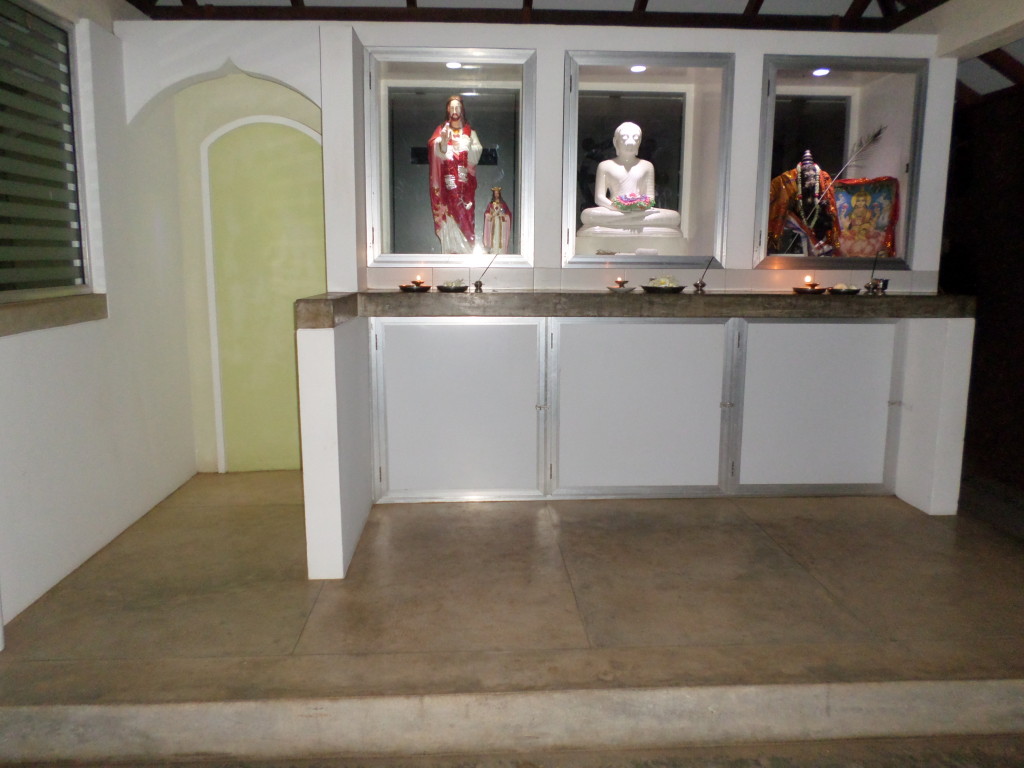 The joint multi-faith prayer shrine at the Nilaweli Beach hotel in Trincomalee |
Delegates also used multi-modal means of transport which also reflected the evolution from swords to ploughshares. A VIP train last used for the Commonwealth summit was spruced up and used for a scenic six-hour journey from Colombo to Passikudah. From Passikudah to Trincomalee, delegates journeyed by bus. The following day, they clambered aboard a military helicopter for the technical tour to Jaffna and back to Colombo. In Jaffna, naval patrol boats were used to cross over to one of the islands. All the means of road, rail, sea and air transport once used for military purposes now were integrated to carry delegates to, from and within a single, unified tourism conference. (See pictures below).
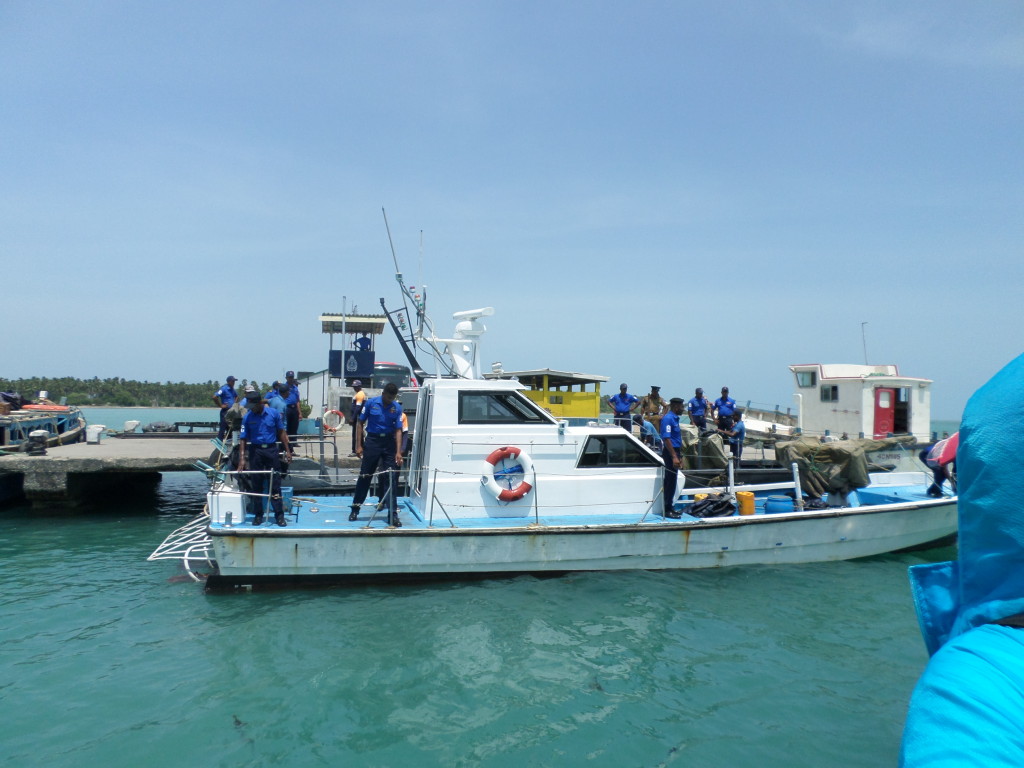 Naval patrol boats which ferried delegates to the island off Jaffna to visit the Nagadeepa Purana Viharaya Buddhist temple. |
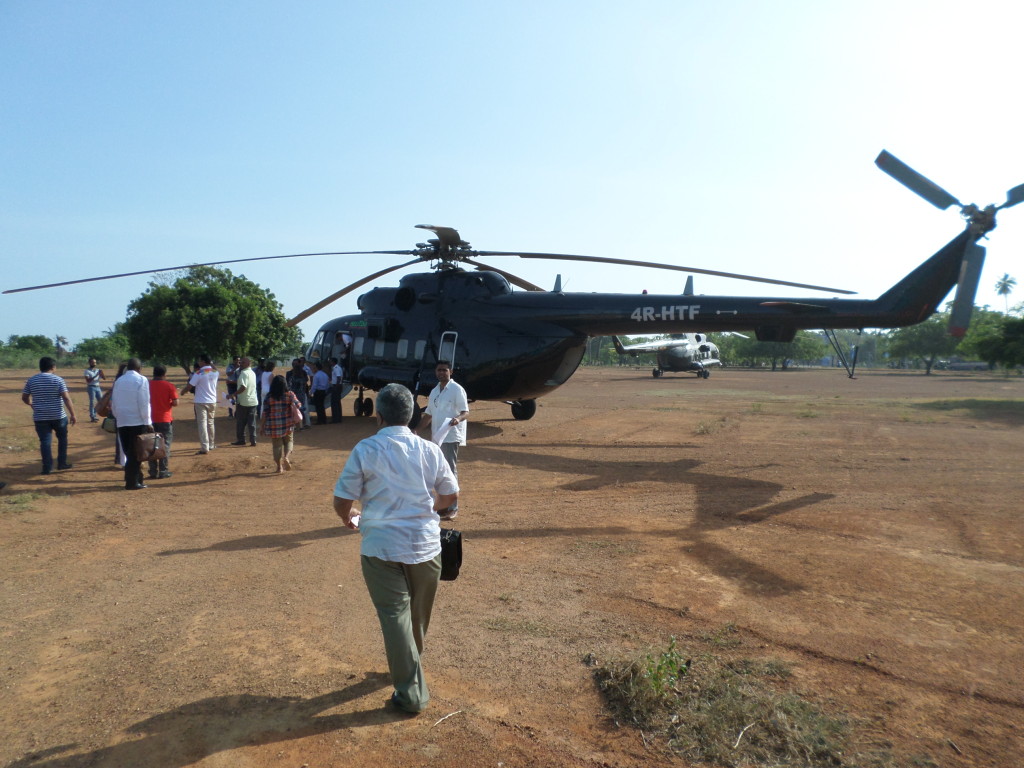 One of two military helicopters which ferried delegates from Passikudah to Jaffna and Colombo. |
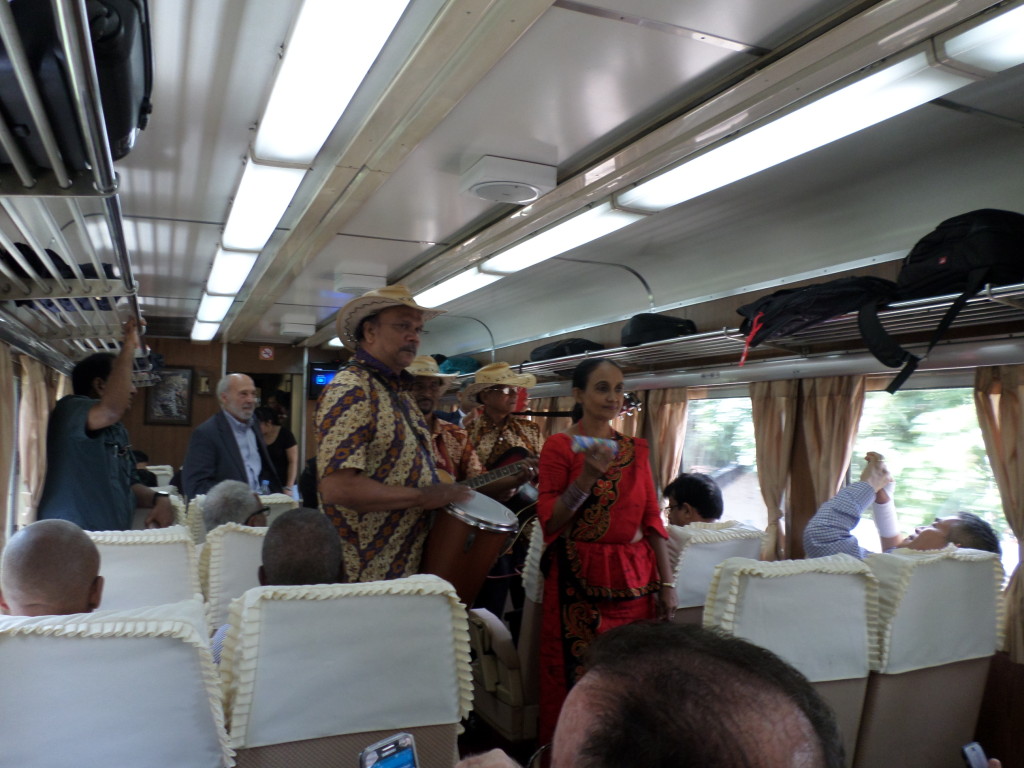 Excellent entertainment aboard the Peace Tourism Train from Colombo to Passikudah. |
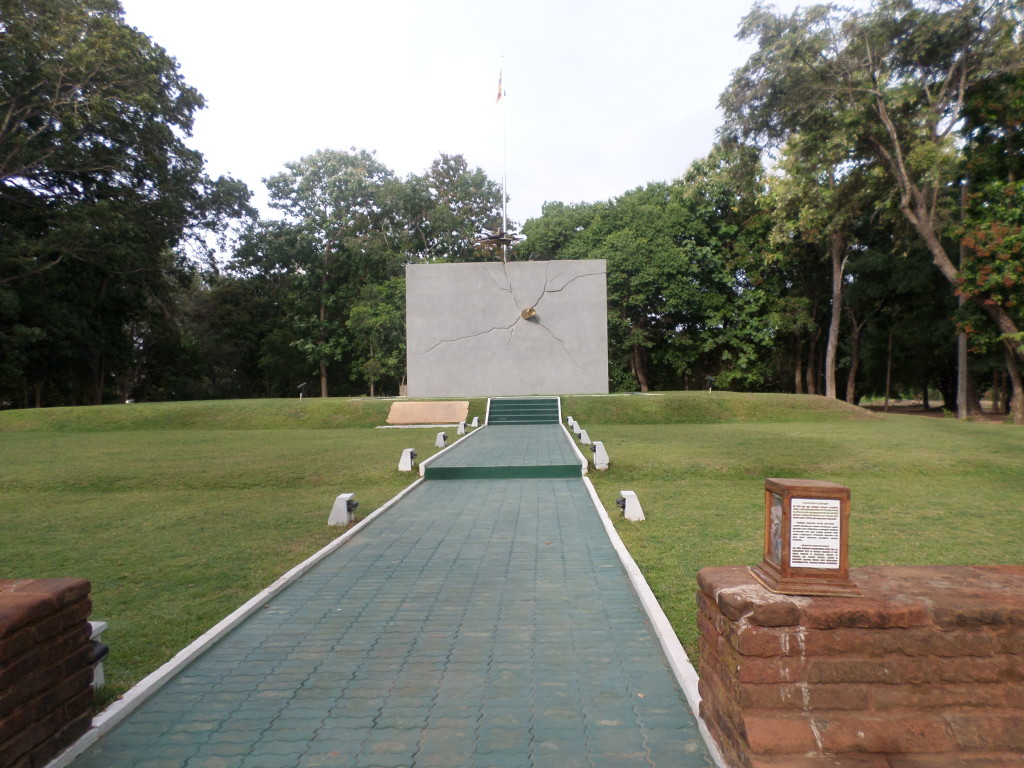 One of the war memorials on the road from Jaffna to Colombo |
Dr Rifai said he is keen to build on the outpouring of ideas, enthusiasm and energy to expand the theme concept to other parts of Asia and the world. Various destinations are being sounded out to host future such events. They may be mainly talk-shops but if they can galvanise the massive power of global tourism into a prevention-rather-than-cure force for peace, it can go a long way towards confronting and perhaps eventually defeating the industry of death.
An extensive collection of photographs of the entire event are posted here: https://www.flickr.com/photos/unwto/sets/72157671044651435
Excerpts from inaugural speech by Mr. John Amaratunga, Minister of Tourism Development and Christian Religious Affairs and Lands
Fifty years ago at a conference like this the UNWTO discussed how tourism could be the passport to peace. Today we don’t have to look far to see this in reality. There is no doubt that tourism is not only a catalyst in the development of the entire north and east of this country but is also an important tool in the reconciliation process
There is no other industry that brings together people than the tourism industry. Tourism is an industry that has the power and the potential to transform entire communities in a relatively short period of time. The economic benefits of tourism are felt far and wide beyond the local communities. In fact our national economy is dependent on the success of this industry for its economic survival.
I’m very thankful to the Secretary General of UNWTO Mr. Taleb Rifai and the UNWTO for choosing to have this important meeting in Sri Lanka. Needless to say we would not be having this meeting if not for the peace that we are enjoying today.
While the world around us, even as close as Bangladesh is in turmoil, we are enjoying absolute peace and I know for a fact that this peace will be protected at all costs. The message that we want to tell the world, is that Sri Lanka is one of the safest places to travel to today and this is the best time to explore the hidden treasures of this land, one such being this very beach in Passikudah
Some of you may know that this region was out of bounds to tourism for almost three decades due to the war. Today we have investors lining up to put up hotels in this stretch of unspolit, unexplored, beach because they see the vast potential for tourism. One reason could be that it is the opinion of many that the beach in Passikudah resembles the beaches in our neighbour the Maldives.
The revenue that we earn from this industry is the peace dividend that the country has received with the end of the conflict. This government is determined to ensure that this dividend is first enjoyed by those who were at the receiving end during the war. In other words we want the local community to be the biggest beneficiary of the peace dividend
My government has given top priority to the development of tourism in every corner of the country, especially the north and east which were inaccessible during the conflict. Today we see in real life how tourism has become a catalyst in transforming the lives of the local people both economically and socially. When local economies that suffered the brunt of the war become economically stable and the people well off financially, reconciliation becomes that much easier. It has been said over many years that the root cause of the conflict here was economic inequality and marginalization of certain communities. We have learnt our lessons. Tourism is one of the few industries that can develop economies overnight. One example is the Maldives which used tourism to transform that country in to a much sought after destination
It is only now that tourism is transforming the lives of people in this country and especially in the areas that have been starved of development for years. Local communities have benefited from finding employment in hotels, in providing transport and taxi services, in supplying fish, meat and vegetables to the hotels, in providing handicrafts, souvenirs and other items for sale to tourists etc etc. The list goes on.
However I must also say that we have a problem. Many of the youth in these former conflict zones are hesitant to enter the regular workforce because they are not used to the work culture. It is our duty as the government to guide these youth on the correct part and make them contribute to the development of the country
We have a unique situation that could become a case study for the UNWTO. There are many a success story right here in Passikudah. I know of a hotelier here who has used his income from the hotel to build local schools, computer labs and provide other social services. Contrary to stories doing the rounds, the local fishing community is fully supportive of the hospitality industry and are working with the hotels for mutual benefit
Tourism is a highly peace sensitive industry. We experienced this firsthand and now we see this in many parts of the world, especially the Middle East. No one wants to go to a country that cannot guarantee safety. That is why I say reconciliation is of the utmost importance for the sustainability of the tourism industry. Tourism on the other hand will ensure development
What I want to tell all you is that Sri Lanka is aware of what it should do and the role of government. We will work with both the public and private sectors in building a sustainable model that will not only transform the north and east to all year round tourism destinations but also be a beacon to the world in how to rise from the ashes through tourism development
Once again I thank you all for holding this conference in Passikudah and bringing hope to our resurgent tourism industry. Thank you.
